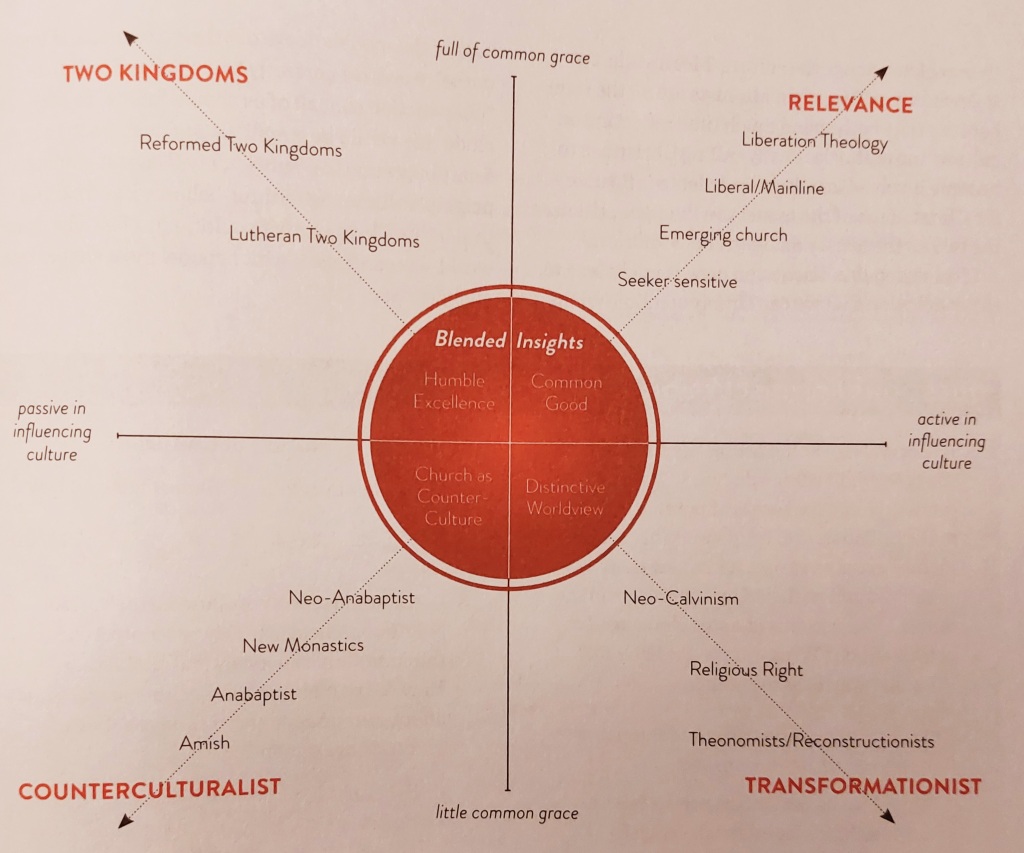This world is a mess. A few decades ago, Carl F.H. Henry wrote: “The West has lost its moral and epistemic compass bearings. It has no shared criterion for judging whether human beings are moving up or down, standing still, or merely on the move only God knows where.”[1] In the absence of a Biblical world-explanation, Henry argued, “[t]he search for an alternative model is beset with confusion, and Western society drifts indecisively toward chaos. Secular scholars seem unable to tell us where we are.”[2]
This is surely correct, even if (32 years hence) it prompts an eye roll and a muttered, “yeah, no kidding!” from the reader. My burden is to suggest what local churches ought to think about this situation—what we ought to do about it, what our posture towards this world ought to be.
First, I’ll define “culture” so we begin on the same page. Second, I’ll sketch[3] three helpful paradigms. The first is from the 1950s, the second from 1994, and the third from 2006. Each tries to answer this same question, in its own context. Each is inspired by the first. Finally, I’ll sketch out my own approach and confess with which paradigm my sympathies lie.
What is Culture?
The term “culture” means the distinctive ideas, customs, social behaviors, and way of life for a particular nation or people.[4] H. Richard Niebuhr suggests “culture” is a synonym for “civilization” or what biblical writers called “the world.”[5] In turn, the definition of “civilization” brings us back round to where we began: “the society, culture, and way of life of a particular area.”[6]
Niebuhr—Christ and Culture
H. Richard Niebuhr’s famous book began life as a series of lectures in which he sought to consider the “double wrestle of the church with its Lord and with the cultural society with which it lives in symbiosis …”[7] Niebuhr’s writing sparkles with an academic vibe. He doesn’t write as a churchman confronting urgent problems, but as a scholar reclining in his armchair, puffing on his pipe, staring into an ethereal distance. There’s nothing wrong with academics, of course—I only mean that his discussion is dispassionate and abstract.
He lays out a five-fold taxonomy of how the church ought to relate to culture:
- Christ against culture. The church is always in opposition. There is a war footing. Christ is opposed to this world, its culture, and He calls us to come out from the world and be separate.[8]
- Christ of culture. He guides civilization to its utopian goal of brotherhood and value. Christ “confirms what is best in the past, and guides the process of civilization to its proper goal.”[9] There is no antagonism.
- Christ above culture. Only thru salvation will Christ lead us to utopia.[10]
- Christ andculture in paradox. We must obey both authorities in this life while we endure and wait for Jesus. There is duality and tension here that is admittedly a bit schizophrenic—many people are likely here.[11]
- Christ transforms culture. This is a conversionist position. Jesus is a leaven that works on society from inside out, spearheading the Gospel all about.[12] There is a positive view of culture—”a sort of Jesus will fix it now” feel.[13]
Bloesch—Responding to Reality
Donald Bloesch was a longtime professor of systematic theology at Dubuque Theological Seminary, in Iowa. In the inaugural tome of his seven-volume systematic, he described four possible responses to modernity.[14] His approach is practical, more “real,” and less theoretical than Niebuhr’s. He is less discussing a theory of Christ v. culture, and more describing how Christians choose to respond to the world as it is.
Here is Boesch’s typology, with some free paraphrasing from me. Not each response will contain all the traits, but the “feel” will be familiar:
- Restoration. There is a more insular focus on “rebuilding the walls” of the church. A “clear and hold” the line against the world ethos. A Christian counterculture mindset may produce a ghettoized outlook. There is impatience with dialogue with “the enemy.” Apologetics is largely defensive, to assure insiders they have “the truth.” There may be a scholastic fidelity to creeds, and a sectarian emphasis on the purity of a particular church. Empirical rationalism or fideism may be present.[15]
- Accommodation. We must update and revise the faith to reach people. We ought to forge a theology that can gain support from and connect with culture. This is essentially Niebuhr’s “Christ of culture.” Bloesch notes “the Christ it upholds is drawn from and shaped by the cultural ethos more than by the biblical revelation.”[16] This is traditional liberal theology. I would put Schleiermacher here, and perhaps some of Rauschenbusch and radical feminist theology like that of Rosemary Reuther, which locates authority in experience.[17]
- Correlation: This is a mediating, “Christ above culture” approach. Apologetics prepares the way for theology, and Christ will eventually reconcile culture with Himself. “[I]nstead of categorically repudiating worldly wisdom, they endeavor to assimilate it in a Christian world view or faith perspective.”[18]
- Confrontation. This is Bloesch’s position. It focuses on the antithesis between faith and culture. Its goal is conversion to the kingdom of God. The Gospel confronts and calls us to defect to God. It’s more about proclamation than apologetics—a “Christ transforming culture”-ish approach. The kingdom is leaven in the world, changing it from within. It is “not an apologetic that leaves the fortress of faith to engage in struggle with the world on its own terrain but an apologetic that finds its security precisely in the fortress of faith and calls the world to unconditional surrender by acknowledging the authority of the fortress of faith over its own domain.”[19]
Keller—All/And
Tim Keller re-shaped Neibuhr’s categories, helpfully critiqued each, and didn’t settle on either model.[20] Each of us, he suggested, is likely attracted to aspects of different models based on our gifts. We ought to treat these models and their attributes like a buffet—picking and choosing strategies based on our cultural moments and context.[21]
Here is Keller’s taxonomy:
- Transformationalist. We engage culture through an emphasis on pursuing our own vocations from a Christian worldview.[22]
- Relevance. “The animating idea behind the Relevance model is that God’s Spirit is at work in the culture to further his kingdom.”[23] This is Niebuhr’s “Christ of culture” and “Christ above culture.”
- Countercultural. The church is a, well … countercultural alternative society opposed to the world.
- Two kingdoms. “God rules all of creation through the ‘common kingdom’ in which people operate by natural revelation and the ‘redemptive kingdom’ in which Christians are ruled by special revelation.[24]
My approach—Bloesch-ish
There is a reason why I defined “culture” at the outset. I’m skeptical that the distinctive ideas, customs, social behaviors, and ways of life for particular nations or peoples in Creation 1.0 will survive the jump to Creation 2.0. So, I don’t believe the church is called to “influence culture,” because this culture is scheduled to go up in flames. This doesn’t mean local churches must be isolationist. I don’t believe congregations exist to “influence culture,” but to push God’s counterculture into the public square as the ordained alternative. Supporting inner-city Gospel missions, crisis pregnancy centers, local schools (etc.) are not ends in and of themselves—they’re vehicles to show and tell God’s values and His Gospel to outsiders.
So, I’m largely unmoved by Keller’s framing (see his horizontal bar across the middle of the graphic), because “influencing culture” is not a goal. Getting people to defect from pagan culture and to God’s community is the goal. Churches must use innovative means to achieve that, motivated by love, compassion, and justice.
So, my framing is less “how do we influence culture” and more “how should we respond to culture.” Thus, I believe Bloesch’s discussion was more helpful. I have freely adapted and condensed his taxonomy and contextualized it for 2022. How should local churches respond to the disaster that is American culture? There are at least three different, contradictory ways Christians choose to answer that question:[25]
- The Alamo (defense). Fortify the walls, stock ammo, hunker down, and wait for Jesus. This is a defensive ethos—it’s about protecting the church. Even apologetics is less about engaging the enemy than about protecting Christians from being seduced by the Dark Side—like poor Kylo Ren. The mantra is to keep things pure and strong while we hold off “the enemy.” Despite protestations, it’s often less about evangelism and the Great Commission, and more about protecting church from danger. There is a pervasive “things ain’t like they used to be, and I’m mad as hell and I’m not gonna take it anymore” vibe at work.
- Play-Dough. Accommodation to cultural tastes, with rationalizations. God is not a gendered being, feminine pronouns for Her are fine, Jesus has no sexual ethics, do what makes you feel good, faith is about feeling, not doctrine, “you do you.”
- Confrontation (offense). This perspective is less about “protecting the church,” and more about winsomely confronting the world employing various innovative means, and calling people to defect from Satan to Jesus.
It might be helpful to picture these three ways in simple pictures:
- The Alamo. Fade in on a castle with its doors barred, its drawbridge raised, its moat filled with hungry crocodiles, snipers on the parapets,[26] people sheltering inside, archers deploying, knights with swords at the ready, anxious to charge if the door is breached. The villages round about are the enemy—and they want to destroy your kids.
- Play-Dough. Focus in on the same castle. The folks are burning it down. They sift through the rubble and donate the stones to local nationals to build a shrine to a Veggie Goddess—who is really just Jesus by another name, anyway.
- Confrontation. The castle is the church’s stronghold in an unholy land—an embassy to represent Christ to folks who want to know more, and at the same time a forward operating base to push His message into the world aggressively, forcefully … and engagingly. It wants local nationals to join the castle community.
Your view of “church v. culture” will shape your posture towards the world:
- Alamo: Focus on holiness for defensive purposes, so you’re not seduced by the Dark Side (like Vader). Emphasis on bible reading, bible interpretation, defending the faith. A relentless, perhaps even unwitting “insider” focus—resources emphasize being educated about “dangers” facing the church, protecting your children, etc.
- Confrontation. Pushing the message and implications of the Gospel outside the church’s walls—spiritual combat with a winning smile.
I fear many of us are tempted to adopt the Alamo ethos. There is a time and place for defense. But, we mustn’t forget offense—and we certainly can’t confuse belligerent defensiveness with that winning offense. For example, June is Pride Month:
- Alamo. We preach defensive sermons from Leviticus 18 and tell our congregation that “homosexuality is bad,” and distribute free books to the congregation explaining why transgenderism isn’t Scriptural.
- Confrontation. We record several short videos telling a better story than the “sex as identity” message so many people believe, then spend several hundred dollars advertising these videos on social media platforms in our local community, and invite comment and discussion.
I believe churches ought to err on the side of Confrontation, which is really just evangelism. It’s easy to stick with the Alamo ethos. I think we must do more.
[1] Carl F.H. Henry, Toward a Recovery of Christian Belief (Wheaton: Crossway, 1990), p. 15.
[2] Ibid, p. 16.
[3] I cannot hope to do more than briefly sketch these approaches—consult the referenced works for more detail and do not assume my abbreviated discussion here captures all the nuance of each author’s position!
[4] Oxford English Dictionary, s.v. “culture,” noun, 7a. March 2022. https://www.oed.com/view/Entry/45746?rskey=Ztxhta&result=1&isAdvanced=false
[5] H. Richard Niebuhr, Christ and Culture (New York: Harper and Row, 1951), p. 32.
[6] New Oxford American Dictionary, s.v. “civilization,” 3, p. 317.
[7] Niebuhr, Christ and Culture, p. xi.
[8] Ibid, pp. 40-41. “That world appears as a realm under the power of evil; it is the region of darkness, into which the citizens of the kingdom of light must not enter; it is characterized by the prevalence in it of lies, hatred, and murder; it is the heir of Cain. It is a secular society, dominated by the ‘lust of the flesh, the lust of the eyes and the pride of life,’ or, in Prof. Dodd’s translation of these phrases, it is ‘pagan society, with its sensuality, superficiality and pretentiousness, its materialism and its egoism.’ It is a culture that is concerned with temporal and passing values, whereas Christ has words of eternal life; it is a dying as well as a murderous order, for ‘the world passes away and the lust of it.’ It is dying, however, not only because it is concerned with temporal goods And contains the inner contradictions of hatred and lie, but also because Christ has come to destroy the works of the devil and because faith in him is the victory which overcomes the world. Hence the loyalty of the believer is directed entirely toward the new order, the new society and its Lord,” (Ibid, p. 48).
[9] Ibid, p. 41.
[10] “… true culture is not possible unless beyond all human achievement, all human search for values, all human society, Christ enters into life from above with gifts which human aspiration has not envisioned and which human effort cannot attain unless he relates men to a supernatural society and a new value-center. Christ is, indeed, a Christ of culture, but he is also a Christ above culture,” (Niebuhr, Christ and Culture, p. 42).
“These men are Christians not only in the sense that they count themselves believers in the Lord but also in the sense that they seek to maintain community with all other believers. Yet they seem equally at home in the community of culture. They feel no great tension between church and world, the social laws and the Gospel, the workings of divine grace and human effort, the ethics of salvation and the ethics of social conservation or progress,” (Ibid, p. 83).
[11] “Hence man is seen as subject to two moralities, and as a citizen of two worlds that are not only discontinuous with each other but largely opposed. In the polarity and tension of Christ and culture life must be lived precariously and sinfully in the hope of a justification which lies beyond history,” (Niebuhr, Christ and Culture, p. 43).
[12] “Christ is seen as the converter of man in his culture and society, not apart from these, for there is no nature without culture and no turning of men from self and idols to God save in society,” (Niebuhr, Christ and Culture, p. 43).
[13] “Hence the conversionist is less concerned with conservation of what has been given in creation, less with preparation for what will be given in a final redemption, than with the divine possibility of a present renewal,” (Ibid, p. 195).
[14] Boesch, Theology of Word & Spirit, pp. 252-272.
[15] “A sectarian theology will do battle for the sake of the church or the elect, the gathered fellowship of true believers, not for the sake of the world for whom Christ died,” (Bloesch, Word & Spirit, p. 268).
[16] Ibid, p. 257.
[17] “If a symbol does not speak authentically to experience, it becomes dead or must be altered to provide a new meaning,” (Rosemary Reuther, Sexism and God-talk: Towards a Feminist Theology (Boston: Beacon, 1993), pp. 12-13).
[18] Bloesch, Word & Spirit, p. 262.
[19] Bloesch, Word & Spirit, p. 271.
[20] Timothy Keller, Center Church (Grand Rapids: Zondervan, 2012), pp. 194-243.
[21] Ibid, p. 240.
[22] Ibid, p. 197.
[23] Ibid, p. 202.
[24] Ibid, p. 209.
[25] This is adapted from Donald Bloesch’s discussion in A Theology of Word & Spirit (Downers Grove: IVP, 1994), pp. 252-272.
[26] I’m aware modern snipers didn’t exist in medieval times, but just go with it …





 In his wonderful book,
In his wonderful book, 




